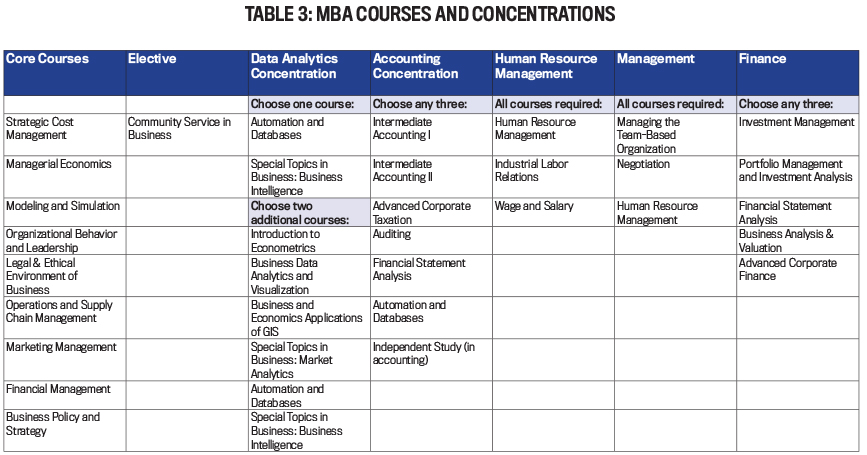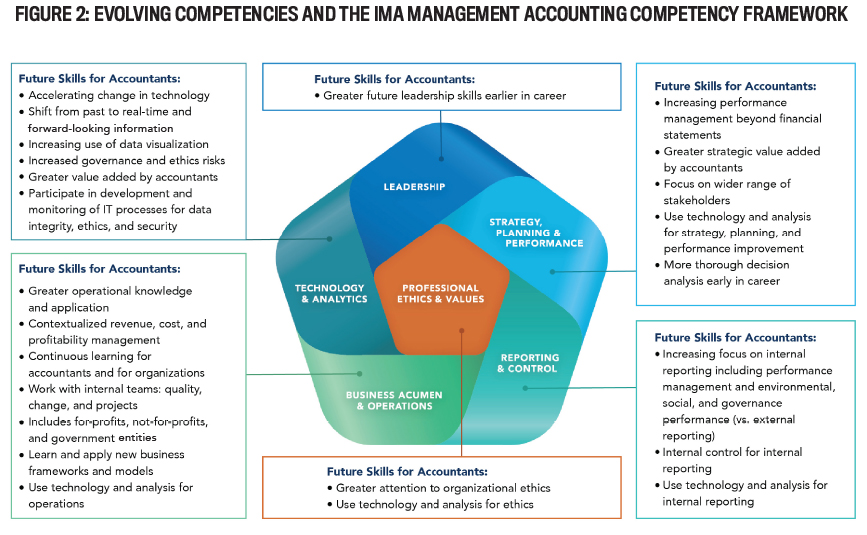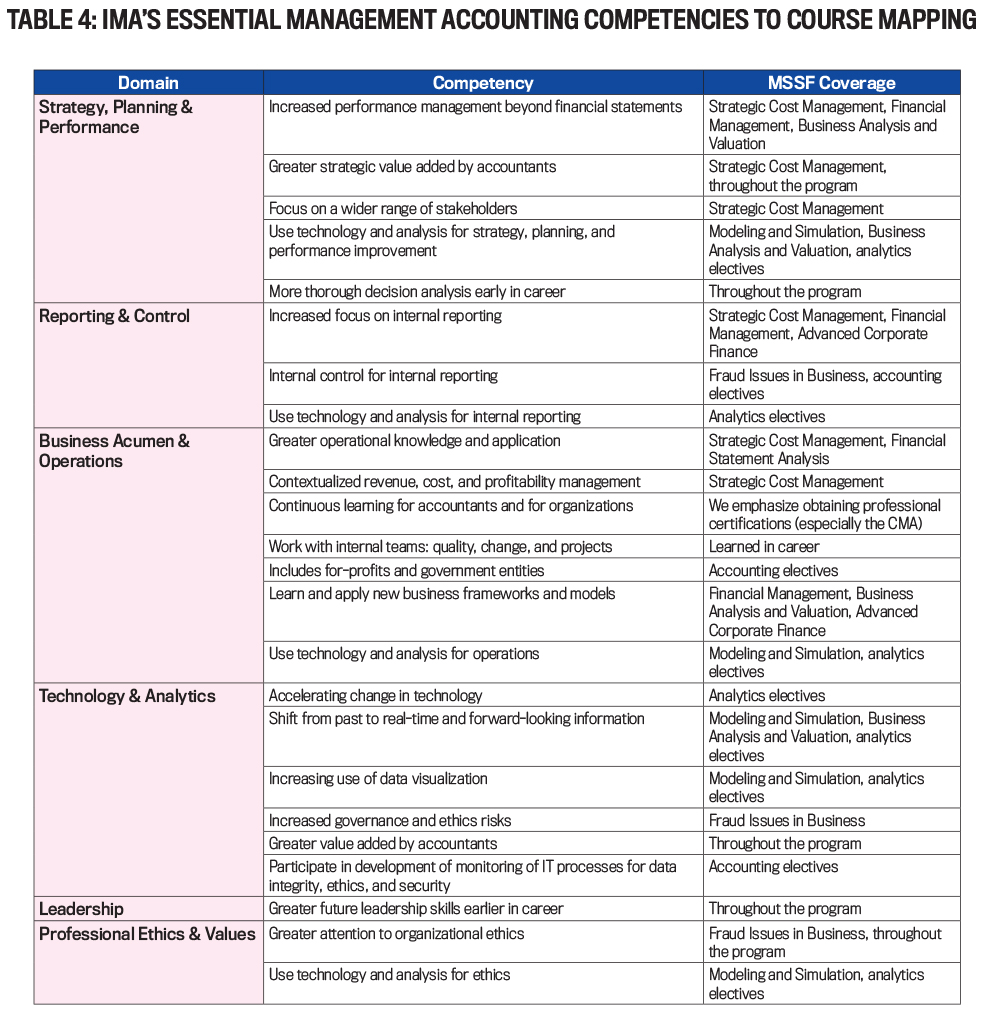Strategic decision making plays an important role in management accounting. Accounting and finance professionals must possess the necessary skills to make strategic decisions and navigate ethical dilemmas. As a result, there’s a need for colleges and universities to teach not only functional knowledge of accounting and finance but also the skills needed for students to make strategic decisions in their future careers.
While Indiana University Southeast (IUS; see “IUS Background”) first developed two traditional graduate business programs, the MBA and the Master of Science in Accountancy (MSA), it developed the Master of Science in Strategic Finance (MSSF) in response to this need. Since its inception in 2004, the MSSF, which is now a respected program in the IUS School of Business, has evolved, culminating in its current status as a fully online program offered collaboratively among five regional Indiana University (IU) campuses through the IU Office of Online Education.
Through the MSSF degree, students develop knowledge and abilities for successful careers as accounting or finance professionals and leaders. This degree delves into topics that enhance students’ skill sets that they can use after they graduate and years beyond graduation. Let’s explore how this successful program came to be at IUS.
IUS BackgroundIUS is a regional campus in IU’s seven-campus system. It’s located on the northwest side of the Louisville, Ky., metropolitan area. Kentucky students in seven counties around Louisville can attend IUS at Indiana in-state (reciprocity) tuition rates to earn a Big Ten degree (the Big Ten Conference is the oldest Division I collegiate athletic conference in the U.S. Big Ten schools are major research universities with large financial endowments and strong academic reputations). In fall 2022, IUS had 3,842 students, with most of those students from Indiana and about 35% from Kentucky. The IUS School of Business offers a bachelor’s degree with 10 concentrations, including accounting and finance. The IUS School of Business also offers three master’s degrees: MBA, Master of Science in Management (MSM), and MSSF. |
HISTORY OF THE MSSF DEGREE
IUS’s first graduate business degree was the MBA in 1991, followed eight years later by the MSA, which was the school’s attempt to prepare students more thoroughly for the CPA (Certified Public Accountant) exam and for a professional accounting career. Specifically, IUS offered the MSA to meet the CPA 150-credit hour requirement in the U.S. state of Indiana. The MSA included graduate accounting courses considered traditional at that time and required 30 credit hours after meeting foundation requirements. The foundation courses were considerable for someone without an accounting background.
Most of the foundation courses were three credit hours, resulting in a total of 43 credit hours required before students officially entered the graduate program. These courses and credit hours essentially ensured that individuals entering the MSA program had the accounting components of an undergraduate accounting degree. The MSA was clearly designed for business students preparing for the CPA exam. See Table 1 for the foundational courses and required graduate courses for the MSA.
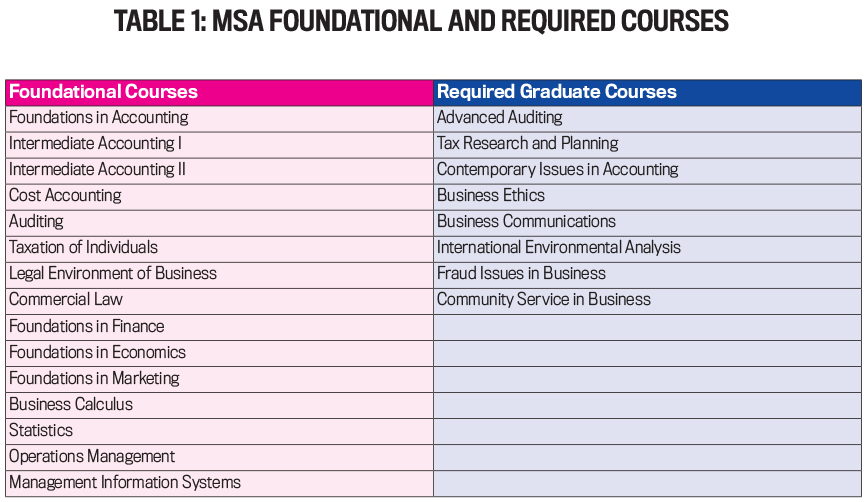
While the intent for this degree was admirable, low enrollments didn’t enable continuity of the program. Only six students graduated with the MSA. After four years of the MSA, IUS started to rethink the program to become one that would address student educational needs, including more than CPA exam preparation, and that would be attractive to potential students and their employers.
Around the same time, accounting and finance faculty attending academic and professional conferences gauged the changing landscape of accounting education. The push in accounting and finance higher education emphasized information technology, strategy, and valuation in addition to the core accounting curriculum. This industry focus, along with low enrollment in the MSA program, encouraged IUS to rethink the direction of the program. A review of programs nationwide identified no school offering a master of science in strategic finance, further spurring the decision to drop the MSA and develop an MSSF program at IUS. The MSSF originally was a 30-credit hour program with seven core courses and three elective courses. It didn’t have the sole intent to prepare students for the CPA as the MSA did. The IUS School of Business designed this program with a broader application, specifically to prepare students to become business leaders, especially in accounting and finance fields, with a track focusing on CMA® (Certified Management Accountant) certification.
The learning objectives of the original MSSF program were to:
1. Evaluate accounting and finance concepts and principles.
2. Apply and integrate accounting and finance concepts and tools for analysis and decision making.
3. Interpret and respond to financial and accounting information.
4. Develop ethical strategies to address issues faced by financial and accounting professionals.
Nonbusiness students were required to complete 10 credit hours of foundation courses or their equivalent. Business undergraduates would have already met these foundation requirements. The program also required three additional courses chosen from a long list of electives. (See Table 2 for a list of the core courses and elective courses for the MSSF program.) Clearly, the MSSF took a new direction with broader application than its predecessor program, the MSA.
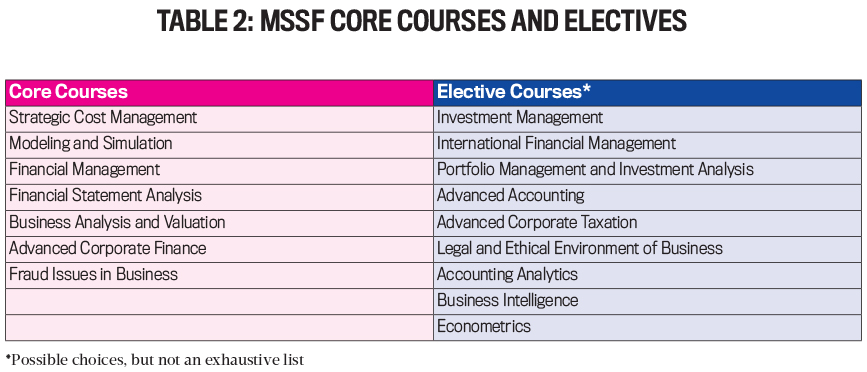
The MSSF program quickly became a strong partner for the vibrant MBA program. Students could complete a double master’s degree with an additional 18 credit hours in addition to the MBA courses (see Table 3). The pairing enhanced enrollments and gave students valuable options. About 10 MSSF degrees have been issued each year since 2006. Figure 1 shows conferred degrees for the MBA and the MSSF since the inception of the MSSF. IUS graduate business programs are part-time programs, so there are many students who take longer than one year to complete the degree. Further, students often enter the IUS graduate business program seeking both the MBA and the MSSF. We advise these students to complete the MBA first and then complete the MSSF. This way, students are more likely to finish one degree even if they don’t complete both degrees. For this reason, the count of degrees conferred underrepresents total MSSF enrollments and interest in the degree, as many MBA students will also eventually pursue the MSSF.
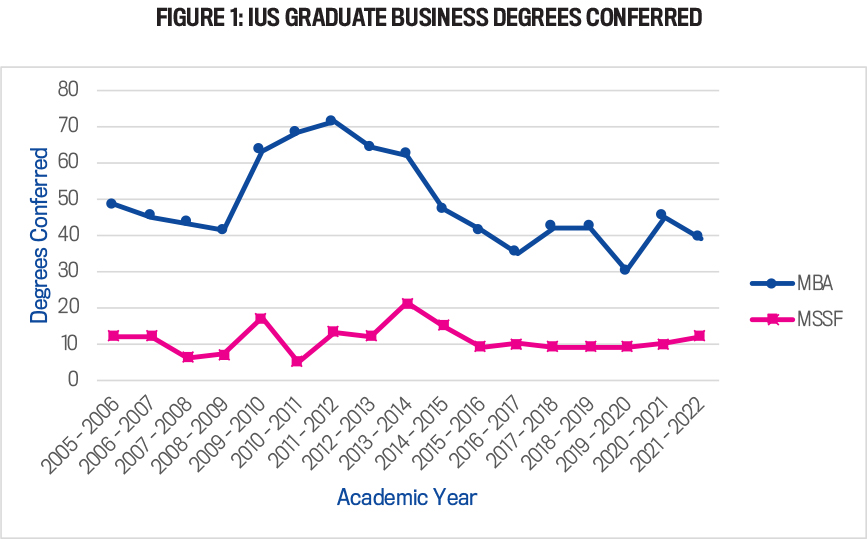
The MSSF program has also been well received by professionals in the service region. A recent graduate employed at a Fortune 50 company said that the courses, assignments, and projects designed with strong real-world applications enabled him to apply those financial principles at his company. Another graduate stated that in a highly dynamic hospitality industry, MSSF program graduates add value to a company in strategic managerial finance and accounting.
The MSSF aligns well with the IMA Management Accounting Competency Framework, which contains six major focal areas: Strategy, Planning, and Performance; Reporting and Control; Business Acumen and Operations; Technology and Analytics; Leadership; and Professional Ethics and Values (see Figure 2). The MSSF program has a specific emphasis on leadership and ethics from an accounting and finance perspective in a business context. Students take classes in both accounting and finance courses to learn about cost management, financial planning, business valuation, analytics, financial statement analysis, fraud detection and prevention, and corporate financial strategy. Through electives, students can take any MBA course as well as additional accounting, finance, and analytics courses. Table 4 provides a more complete mapping of the framework to the MSSF course offerings. While the MSSF doesn’t emphasize specific information technology applications and context for specific industries, there’s a strong correlation of the MSSF program to the IMA Management Accounting Competency Framework.
Source: IMA, Essential Management Accounting Competencies for All Entry-Level Accountants, December 2021.
REEVALUATION OF MSSF
Prior to fall 2019, the IUS School of Business faculty determined it was time to reevaluate the MSSF. Student demand for online university programs was growing, and, therefore, the IUS School of Business decided to offer the program completely online. Taking a program completely online in the IU system requires asking the other regional campuses (IU East, IU Kokomo, IU Northwest, and IU South Bend) to participate. All five regional campuses agreed to participate in offering the MSSF completely online asynchronously. IU’s Office of Collaborative Programs administers collaborative regional programs, such as the MSSF. Each of the regional campuses has a representation on dean and faculty curricular committees for these programs.
In the collaborative online MSSF program, the faculty committee agreed to offer three tracks including managerial finance (CMA), accounting, and investment management (Certified Financial Planner) tracks. IUS continues to offer the original MSSF, with a combination of online, hybrid, and in-person classes, along with participation in the 100% online collaborative MSSF with the other four regional campuses.
The process of developing the online MSSF program involved a meeting of the Collaborative MSSF Faculty Committee. This committee determined the admission requirements, prerequisites (for students without a business degree), curriculum, equivalent courses across the campuses in the curriculum, and faculty qualifications per the Association to Advance Collegiate Schools of Business standards specifically for campuses that hire adjunct faculty with professional experience to teach in the program. In the collaborative online MSSF program, the faculty committee determined eight courses that students must complete and two specific elective courses to specialize in one of the three tracks. The prescribed list of courses in the curriculum was intentionally designed for full-time students to complete their degree requirements in one year with minimal guidance from advisors. To further appeal to more undergraduate business students to earn dual degrees, the faculty committee is designing the curriculum for students to complete the MSSF in five years by extending their undergraduate degree one more year.
The learning outcomes for the collaborate online MSSF are:
1. Analyze the information provided by financial statements and/or other financial resources.
2. Apply finance concepts and tools.
3. Evaluate the implications of potential financial decisions.
4. Apply sound ethical reasoning in financial decision-making processes.
5. Develop appropriate financial strategies.
6. Communicate financial information and strategies effectively.
The program is designed for students from any of two undergraduate backgrounds:
1. Students with undergraduate degrees in business can start straight into the MSSF.
2. Students with nonbusiness backgrounds will need to complete six hours of foundation courses in accounting, finance, economics, and quantitative tools.
The collaborative online MSSF is a 30-credit hour program. In addition to core 24-credit hours, students take an additional two courses based on the track they select (see Table 5). The core courses in the collaborative online MSSF are the same as the original MSSF, with the addition of a graduate version of Intermediate Accounting. The primary differences between the original MSSF and the collaborative online MSSF are the reduced foundation courses, the addition of Intermediate Accounting in the core, and the possibilities offered with the three tracks and their related coursework. The collaborative online MSSF closely reflects the IUS original MSSF curriculum because IUS initiated the proposal for the collaborative degree.
In spring 2023, the IU Office of Collaborative Academic Programs (part of IU’s Office of Online Education) officially launched the collaborative online MSSF nationwide with the first group of students to be admitted to the program beginning in fall 2023.
Replacing the MSA with the MSSF has been successful. While the MSA was a highly specialized degree, the MSSF serves many more students. Through the 2021-22 academic year, 188 degrees have been awarded since the first degree conferred in 2006. The MSSF has prepared many finance and accounting professionals for successful leadership careers. We expect both the in-person version and the fully online collaborative MSSF to be vibrant programs for years to come.
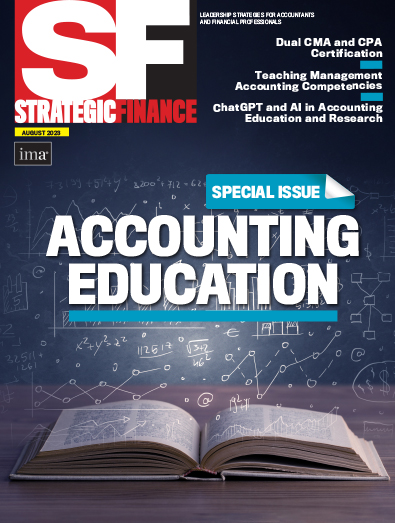
August 2023


